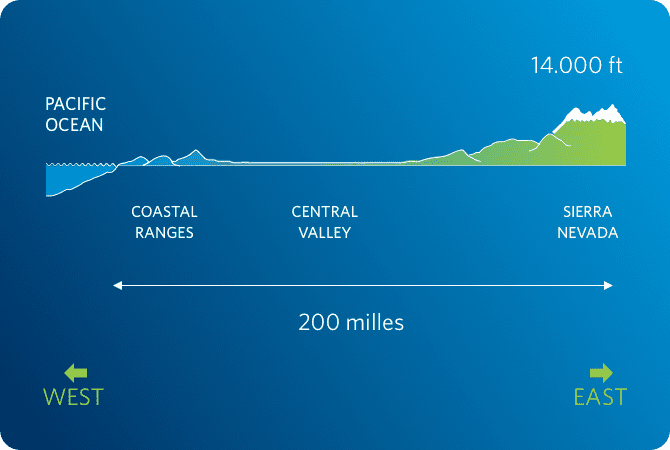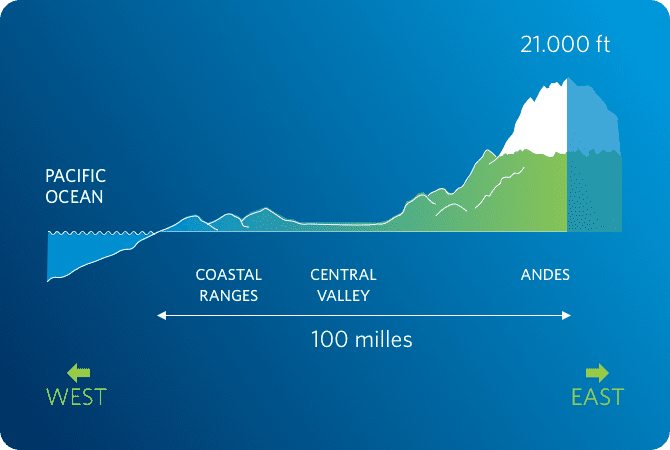• Chile and California coincide geographically between latitudes 30º and 40º in their respective hemispheres.
• Both regions have extensive coasts along the Pacific that strongly influence their economies and cultures.
• Their central coastal areas constitute 2 of the 5 ecosystems in the world that have Mediterranean climates, which means that their energy and agricultural potentials are quite similar.
• Both territories are located where tectonic plates meet, which means that earthquakes are frequent.
The link between Chile and California dates back to the mid-nineteenth century, when the “Gold Rush” created the first loose ties between these trans-hemispheric twins. Since then, a deep relationship has been forged based on collaboration and an exchange of knowledge in various areas to the mutual benefit of both regions.
1963
Inception of the Chile California Program. In the early 1960’s, Chile and California signed an agreement as part of John F. Kennedy’s Alliance for Progress Program.
1963
2008
2011
2012
2013
2014
2015
2016
2017
2018
2019
2020
2021


Inception of the Chile California Program. In the early 1960’s, Chile and California signed an agreement as part of John F. Kennedy’s Alliance for Progress Program.
Launch of the Chile California Plan. The Chile California Plan was created as a result of the Memorandum of Understanding between Chile’s President Michelle Bachelet and California’s then-Governor Arnold Schwarzenegger.
The Chile California Council incorporated as a 501 (c)(3) non-profit on the occasion of President Sebastián Piñera’s visit to California, bringing together representatives from both public and private sectors.
The CCC starts operations, appoints Executive Director and organizes the board into 5 committees: Environment, Innovation, Education, Trade, and Society.
Chile and California renew an Agreement for Collaboration. Lt. Governor Gavin Newsom gives keynote address during the CCC Annual Meeting highlighting the importance of technology in governance.
The CCC Board of Councilors approves a strategic plan for the next 4 years, emphasizing functional areas such as fundraising, communications, and finance.
President Bachelet and Governor Brown sign a historic joint declaration on climate change. The new UC Davis Chile Life Science Innovation Center launched.
The CCC expand its influence in Chile and California by facilitating support and collaboration between CONAF- CALFIRE on wildfires prevention and control, and between Chile’s Oficina Nacional de Emergencia (ONEMI) and California’s Office of Emergency Services (CAL OES) on disaster management.
The CCC focuses on three areas: Natural Resources Management, State and Society and Technology. It creates Chispa-Spark Funding: a lean platform to finance initial stages for mutually beneficial projects in Chile and California.
The CCC holds the first major conference on renewable resources, storage, and electric mobility.
he CCC focuses on climate actions working towards transformational processes related to tackling the climate crisis. Participates and gets involved in the organization of the COP25, showcasing California’s coastal and climate policies and a Chilean scientific coalition studying Climate Change’s effects along Chile’s coastline.
Humanity faces a pandemic and the Chile California Council adapts to the new normal by participating and leading webinars where relevant issues in today’s world are discussed.
The CCC focuses on in-depth structuring and consolidating programs, in addition to miscellaneous initiatives within its climate action driven agenda, particularly in the clean energy transition and coastal protection.


